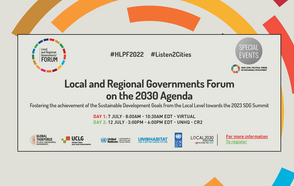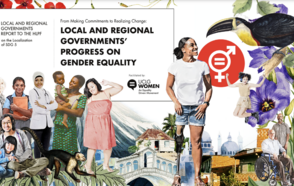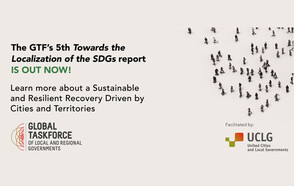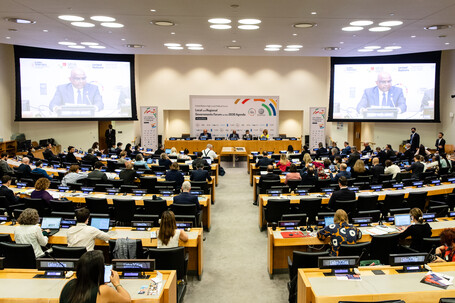
In the framework of the 2022 High-Level Political Forum (HLPF), the constituency of local and regional governments reached a milestone: the celebration of the fifth Local and Regional Governments Forum, which cements the space for our constituency in the global review and follow-up of the New Urban Agenda.
The Fifth Forum, which took place in two sessions (virtually during the 7th of July, and physically in the United Nations headquarters on the 12th) provided a space to raise the voices of local and regional governments, present the 2022 Report to the HLPF and place the importance of service delivery front and center in all discussions on the achievement of the agendas and address the value of local and subnational reporting as tools for transformation beyond complements to national reporting Over 40 mayors and governors, together with representatives of national governments and directors of UN agencies gathered, virtually and physically in New York, in the first hybrid HLPF since the beginning of the pandemic.
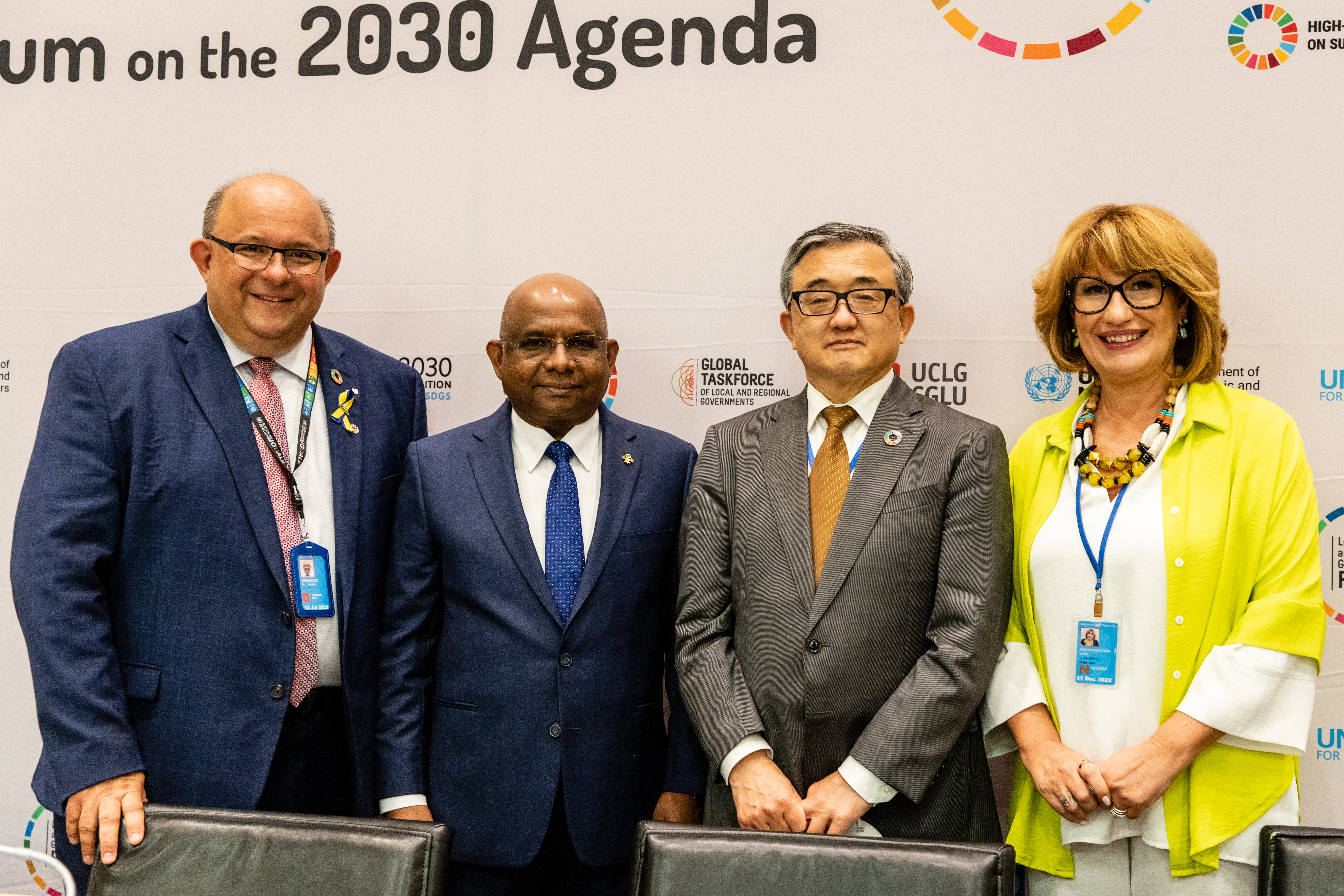 The Local and Regional Governments Forum opened with President of the UN General Assembly Abdullah Shahid acknowledging the importance of mayors in the first response to crises. The entirety of the SDGs, he recalled, needs to be achieved through collaboration and the alliance of all stakeholders, and in particular of local and regional governments. Finally, he called on all spheres of government to include populations in decision-making, especially women, to ensure SDG 5. Wrapping up, he addressed the importance of the role that local and regional governments play in protecting their surroundings and life on land and in the sea, as critical respondents in their territory.
The Local and Regional Governments Forum opened with President of the UN General Assembly Abdullah Shahid acknowledging the importance of mayors in the first response to crises. The entirety of the SDGs, he recalled, needs to be achieved through collaboration and the alliance of all stakeholders, and in particular of local and regional governments. Finally, he called on all spheres of government to include populations in decision-making, especially women, to ensure SDG 5. Wrapping up, he addressed the importance of the role that local and regional governments play in protecting their surroundings and life on land and in the sea, as critical respondents in their territory.
“My presidency has placed an important emphasis on the participation of the population in democratic processes, in ensuring everyone has a say. This is why I believe that local and regional governments are critical to mainstream gender issues across all areas of their work, including through non-discriminatory service provision and strong female leadership to ensure politically empowered women and girls”. President of the UN General Assembly Abdullah Shahid.
Liu Zhenmin, Under-Secretary-General of UNDESA, added to this vision the importance of local and regional reporting and the need for national governments to include local and regional governments in their plans, as well as for the importance of Voluntary Local and Subnational Reviews.
UCLG Governing President and Mayor of Kitchener Berry Vrbanovic reminded that, ahead of the milestones that we have in the coming years, and in order to meet the urges that we face, we need to “foster a renewed, more inclusive, multilateral system based on ownership, co-creation and peace, and the only way that we will meet the goals.”
Haoliang Xu Assistant Secretary-General, UNDP moderated the first panel, which focused on the role of local public service provision in achieving the 2030 Agenda, recalling that UNDP holds service delivery in high regard, as a critical element to achieve the goals as one.
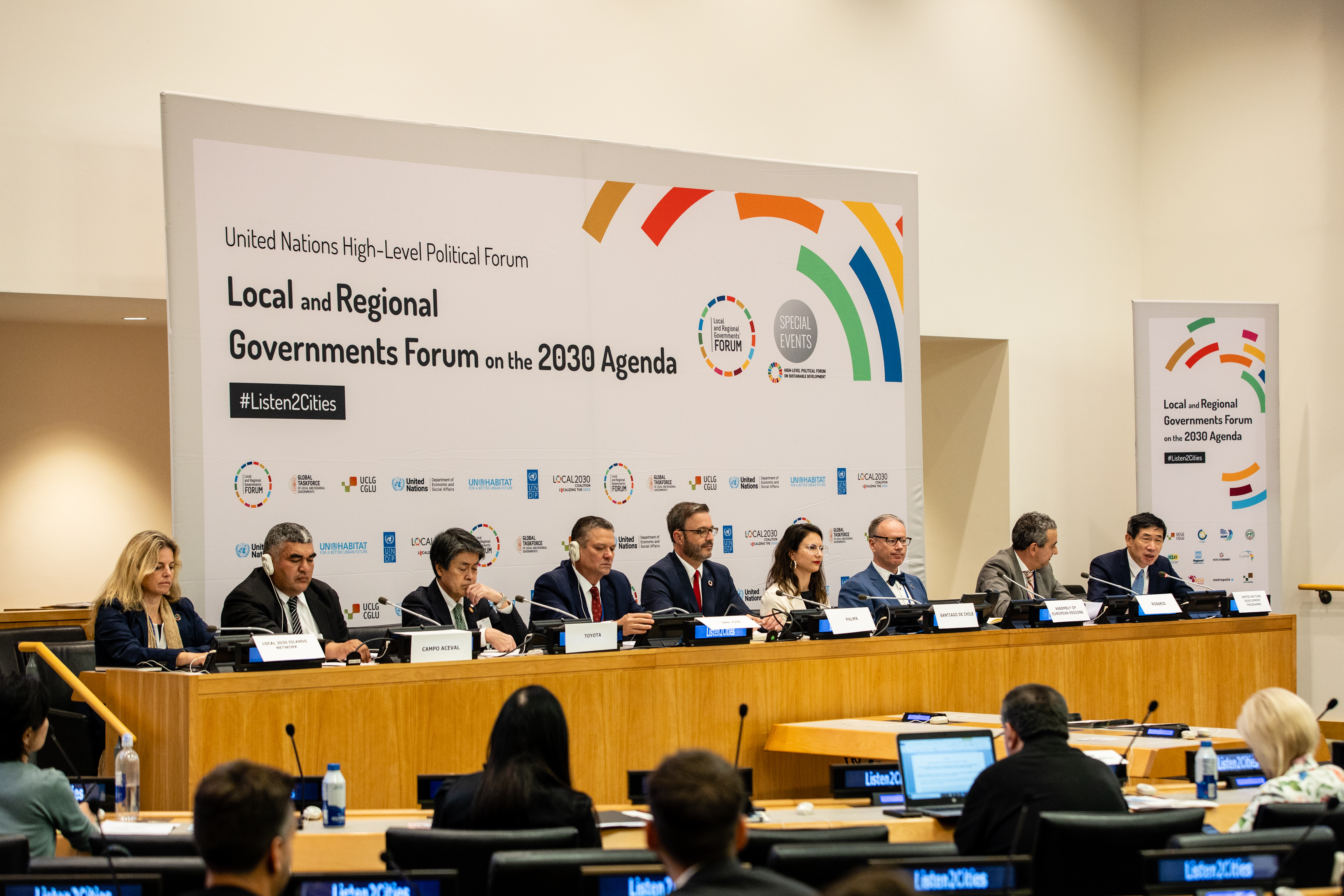
Irací Hassler, Mayor of Santiago de Chile, brought to the table the importance of public spaces, and how the pandemic is reminding us that health in cities goes beyond healthcare. Recovering public spaces such as parks, which are lungs for life in cities, she argued, is fundamental, as is ensuring that our communities can own the spaces in which they live
Magnus Berntsson, Vice President of the Regional Council of Västra Götaland showcased how the region had structured its development strategy under the framework of the SDGs and how they had worked to communicate with all stakeholder
Toshihiko Ota, Mayor of Toyota, presented the VLR of the city, which he highlighted would contribute to accelerating our action towards 2030. The Toyota VLR highlighted initiatives to contribute to the SDGs at local level, working with multiple stakeholders. Joseph Shawarbeh, Mayor of Amman, presented the VLR of Amman and highlighted the linkages between the is in line with the second VNR of Jordan, which have led to providing an opportunity to complement the efforts of local and regional levels from the bottom-up.
Pablo Javkin, Mayor of Rosario, called for placing care at the center, and how the local plans of Rosario had been aimed at including all stakeholders in order to care for those who suffer inequities the most, including women, children, and older persons. The role of basic services in providing care was emphasized, in turn, by Mayor of Palma José Hila, who highlighted in turn the importance of aligning budgeting with the SDGs.
Alberto Pereira Fernandez, Mayor of Campo Aceval, further called on multilevel coordination to achieve the goals, calling to implement politics from the bottom-up to achieve concrete results. Celeste Connors, Executive Director of the Hawai'i Green Growth and Co-chair of the Local2030 Islands Network presented the Local2030 Hub of Hawai’i, guided by long-term sustainability commitments, and argued that islands are at the forefront of climate changed and are often ignored, especially when they also are subnational governments.
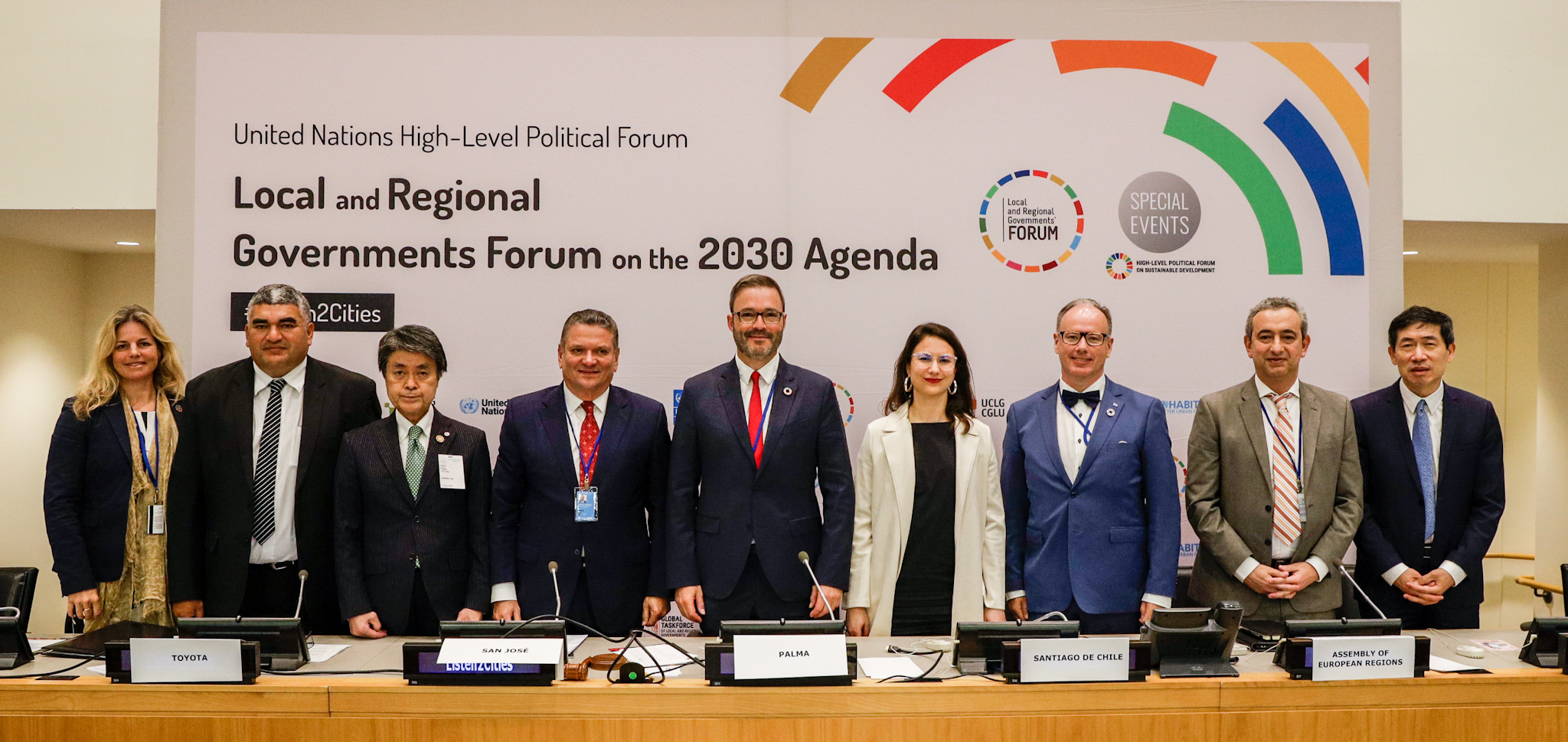
Lucy Slack, Secretary General of CLGF moderated the second panel, which focused on the SDG Summit to be held in 2023, with the importance of progress towards achievement to the SDGs, and how to accelerate implementation. Johnny Araya, Mayor of San José and UCLG Copresident, called on the HLPF to include subnational reporting with a specific space as part on the monitoring.
Van Zanen, Mayor of The Hague and UCLG Copresident, called for co-creation of policies and frameworks to implement the SDGs by arguing that localization does not meen nation-states no longer have a responsibility, but it means that we need to collaborate. Partnerships remain crucial, between governments, civil society, and the private sector to ensure we are adequately empowered.
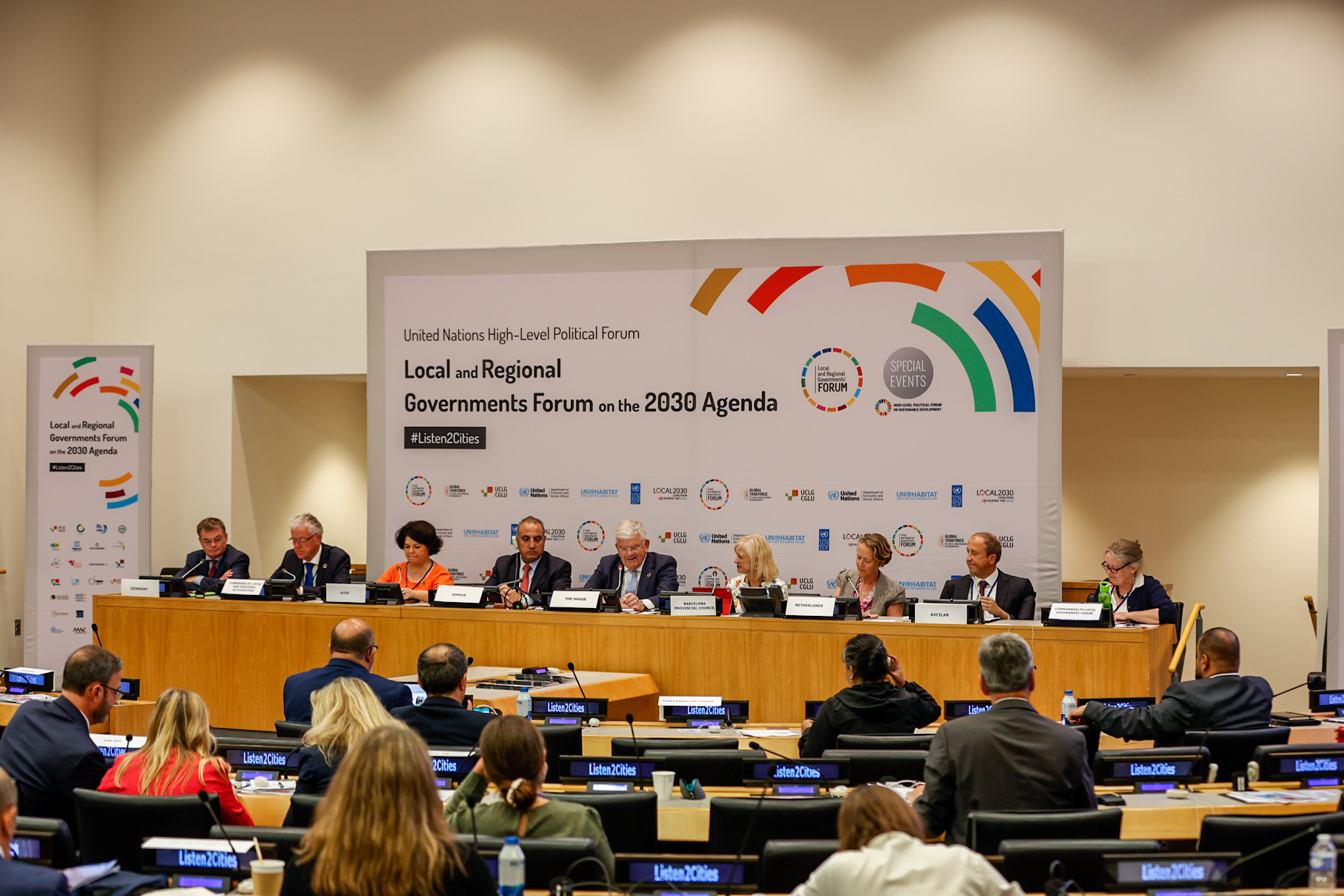 Turan Hançerli, Mayor of Avcilar, doubled down on the need to care for displaced populations and migrants as the way to build on common dreams of our communities. This approach, he argued, is the only way to maintain democratic tolerance and achieving peace in our communities.
Turan Hançerli, Mayor of Avcilar, doubled down on the need to care for displaced populations and migrants as the way to build on common dreams of our communities. This approach, he argued, is the only way to maintain democratic tolerance and achieving peace in our communities.
Valerie Dumontet, Vice-President of Aude argued that the SDG Summit is a critical moment to allow for the positioning of local and regional governments as actors to achieve the SDGs, as actors on the front-line that provide care to their communities.We are always there. We take care of our communities, whatever the crisis. Focusing on the SDGs is a responsibility. We are catalysts of resilience, taking on the local innovation as critical actors for sustainable advancements.
Sandra Pellegrom, Netherlands SDG Coordinator , brought the VNR report of the Netherlands to the forefront, and the linkages with local and subnational reporting, including the cities that have been consulted. Looking at the future, she argued, it is essential to include local and regional governments to further the SDGs. This is about systemic change, and no single actor has all the answers
Pilar Díaz, Deputy of the Presidency for the Barcelona Provincial Council, argued for the need to push for decentralization processes that allow us to operate through efficient governance mechanisms and strengthened decision-making capacity. We need greater empowerment of cities and LRGs if we are to empower citizens. SDG 11.
Leen Verbeek, President of Congress of Local and Regional Authorities, called on national governments to give cities and regions the resources and responsibilities to act and the voice to share experience. Only then, he argued, will they be critical actors for the achievement of the goals.
Representatives of the Global Taskforce and the United Nations wrapped up the session. Emilia Saiz, Secretary General of UCLG, called for localization to be understood as more than “implementing, since it is about engagement from the bottom-up to contribute to better life. This better life is the 2030 agenda, which goes beyond the SDGs. It’s a philosophy on how to consider the world and how we live it.
Fabrizio Rossi, Secretary General of CEMR emphasized the sense of urgency of the decade of action, calling for the need to further engage with international institutions to empower local and regional governments and bring the SDGs one step further.
Maria-Francesca Spatolisano, Assistant Secretary-General for Policy Coordination, UNDESA, emphasized how the challenges we face demand strong collaboration, and how local and regional governments are taking the lead to bring strong solutions and commitments. She closed the session by calling on the continued support of local and regional governments for all endeavors.
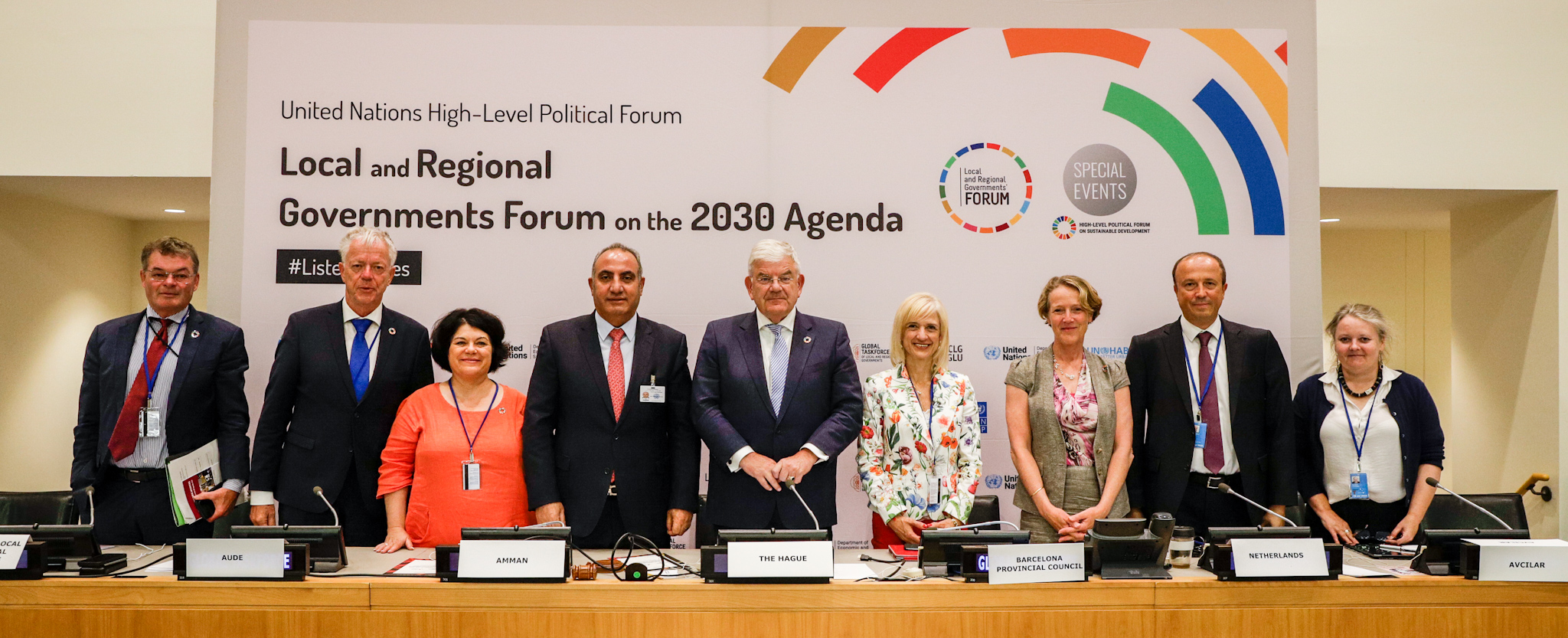
Empowering local and regional governments at the international level, a requisite for achieving the universal development agendas
After the final day of the High-Level Political Forum, the draft ministerial declaration was shared. The Ministerial Declaration of the Forum presented an important step forward in the recognition of local and regional governments in the international sphere, with an explicit acknowledgment of the need to empower Local and Regional Governments to ensure ownership and localization of the SDGs in paragraph 25.

The draft Declaration also calls for the involvement of voluntary subnational and local reviews #VSR #VLR as an essential tool to show progress and foster exchange on local implementation of the 2030 Agenda to foster ownership and bring the voice of our communities and their needs forward at the international sphere.
Local and regional governments and their networks are committed to the localization of the universal development agendas and to ensuring whole-of-government and whole-of-society approaches. The Declaration speaks to our work, but we need to go beyond to keep pushing for the transformation we need
This is why, at the Local and Regional Governments Forum, we called on national governments and the international system to foster a renewed, multilateral system based on ownership, co-creation and peace, including and engaging local and regional governments and their representative associations in all stages of decision-making processes
We are ready to bring about the future that our communities are calling on us to deliver. Read our statement to the HLPF here!
The value of local and subnational reporting: Localization at the High-Level Political Forum through the Local and Regional Governments Forum
On July 7, the session of the Forum was opened by Executive Director of UN-Habitat Maimunah Mohd. Sharif, who began by emphasizing the importance of the SDG Summit, in 2023, and how local and regional voices will be key to accelerate localization and implementation of the goals, expressing the support from UN-Habitat to local and subnational initiatives for the goals.
Achim Steiner, UNDP administrator, brought to the stage how local and regional governments all over the world are making use of the SDG effect, and invited cities to flip the script, with the intention of turning apathy into action and fear into hope.
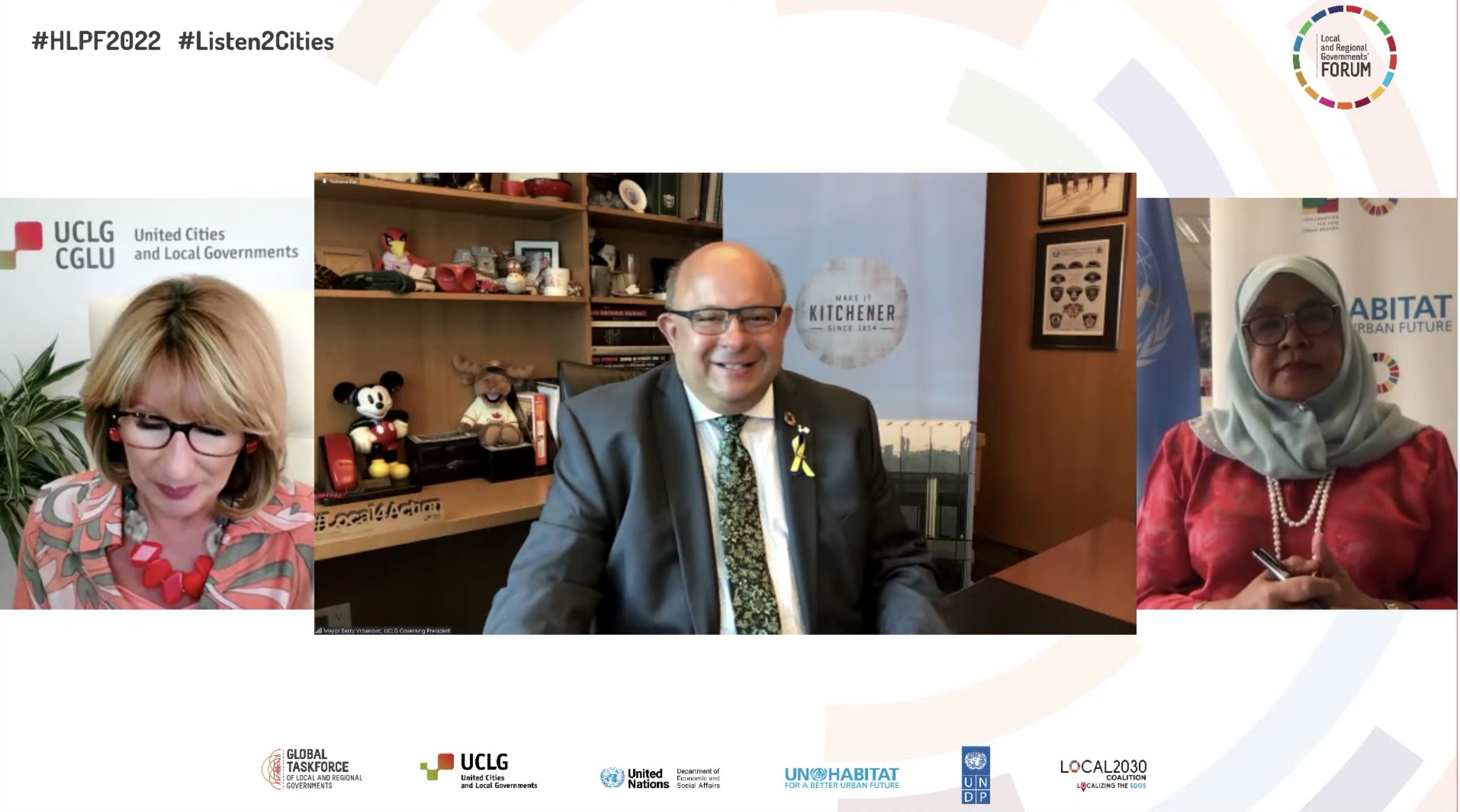 Berry Vrbanovic, UCLG Governing President and Mayor of Kitchener, brought the importance of subnational reporting to the table, and how -in particular- Voluntary Subnational Reviews had represented over 1.2 billion people and are critical to engage in dialogue with national governments. Commitments by local governments, he called, need to be accompanied by engagement by national governments and an enabling environment which creates opportunities.
Berry Vrbanovic, UCLG Governing President and Mayor of Kitchener, brought the importance of subnational reporting to the table, and how -in particular- Voluntary Subnational Reviews had represented over 1.2 billion people and are critical to engage in dialogue with national governments. Commitments by local governments, he called, need to be accompanied by engagement by national governments and an enabling environment which creates opportunities.
The first panel addressed the role of voluntary local and subnational reviews (VLRs and VSRs) as tools for the SDGs Carolina Cosse, Mayor of Montevideo, argued that the process behind VLRs and VSRs are not only commitments, but political tools for the recovery, that identify synergies an partnerships with stakeholders, and help develop data that strengthens both local decision-making and dialogue with citizens.
Rashid El Abdi, President of the Regional Council of Rabat Sale Kénitra, highlighted that VLR-VSR is a way to assess current policies, and revert recentralizing tendencies in a multilateral way. Regional governments have a role to play in creating spaces for exchanges. The regional perspectives were complemented by Jonan Fernández, Secretary General for the Ecological Transition and the 2030 Agenda of the Basque Government, who laid out the methodology of the Basque Government to monitor implementation of the agenda through annual working plans, and reports that evaluate said plans.
Belinda Gottardi, Mayor of Castel Maggiore, introduced the role of the Italian VSR in the discussions around local monitoring, and how it focuses on municipal and super municipal level on SDG implementation, expressing the variety of the Italian local and regional governments through case studies (qualitative data) and quantitative data derived from 48 indicators. Emilio Jatón, Mayor of Santa Fe, laid out the VLR from Santa Fe, and called for support from networks and international organizations in order to help intermediary cities deliver their VLRs.
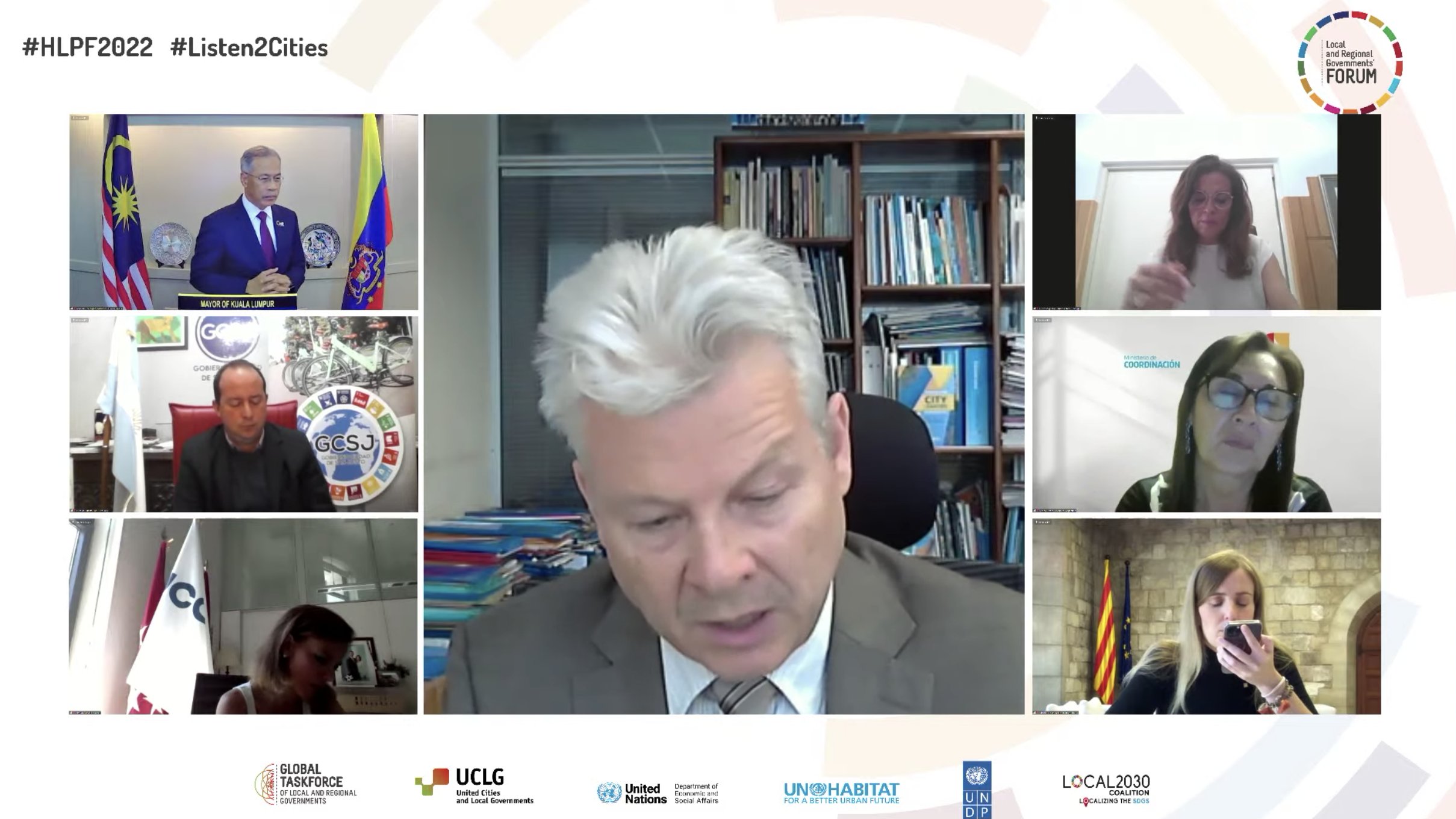
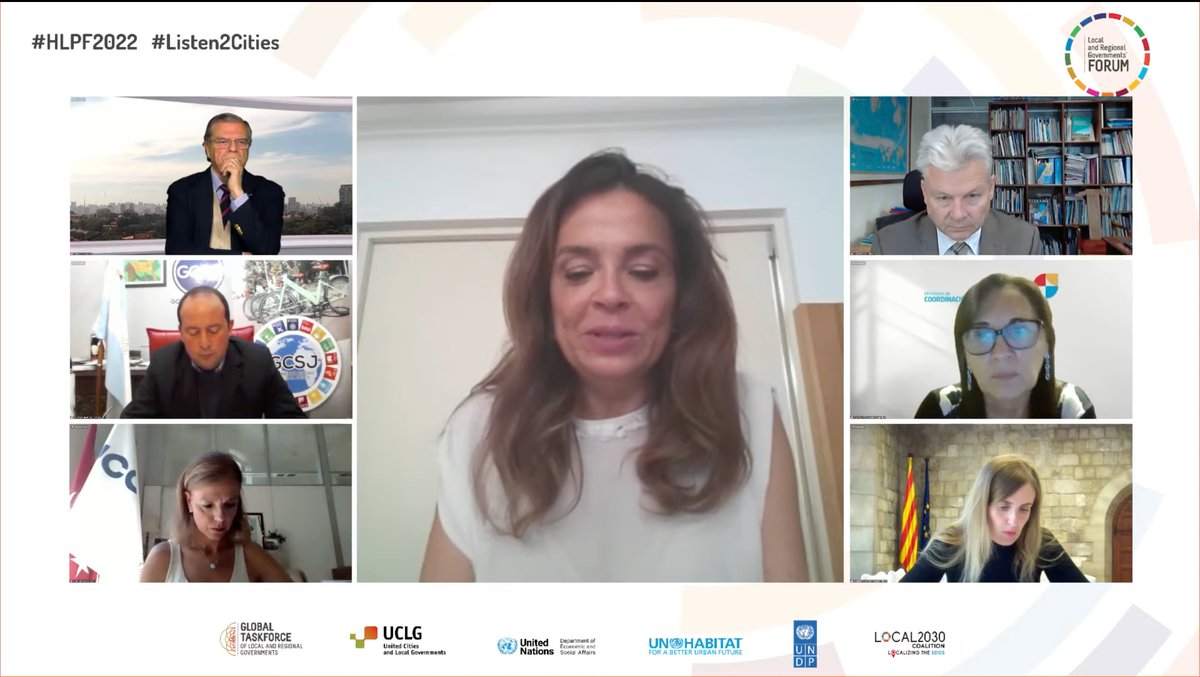
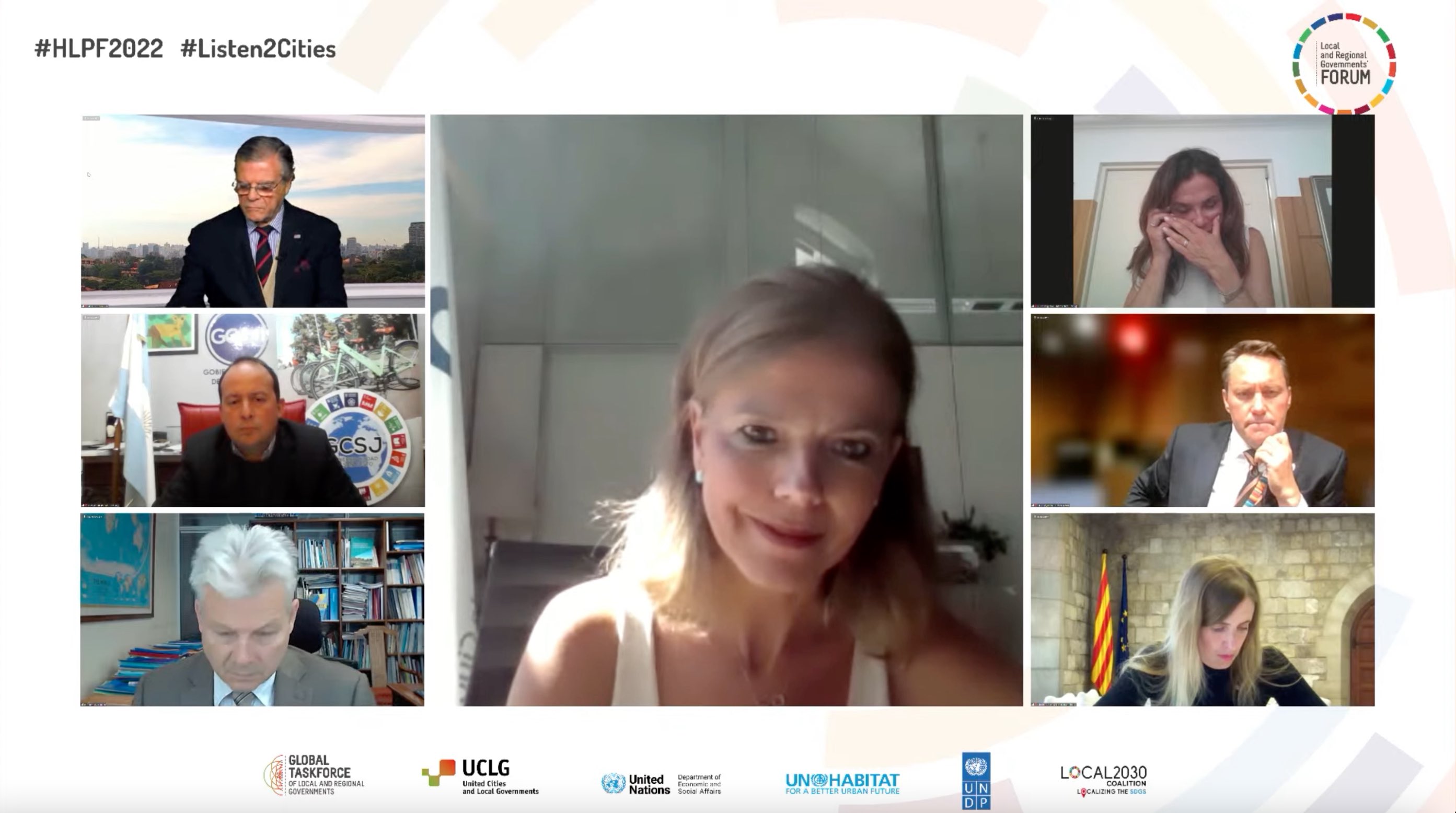
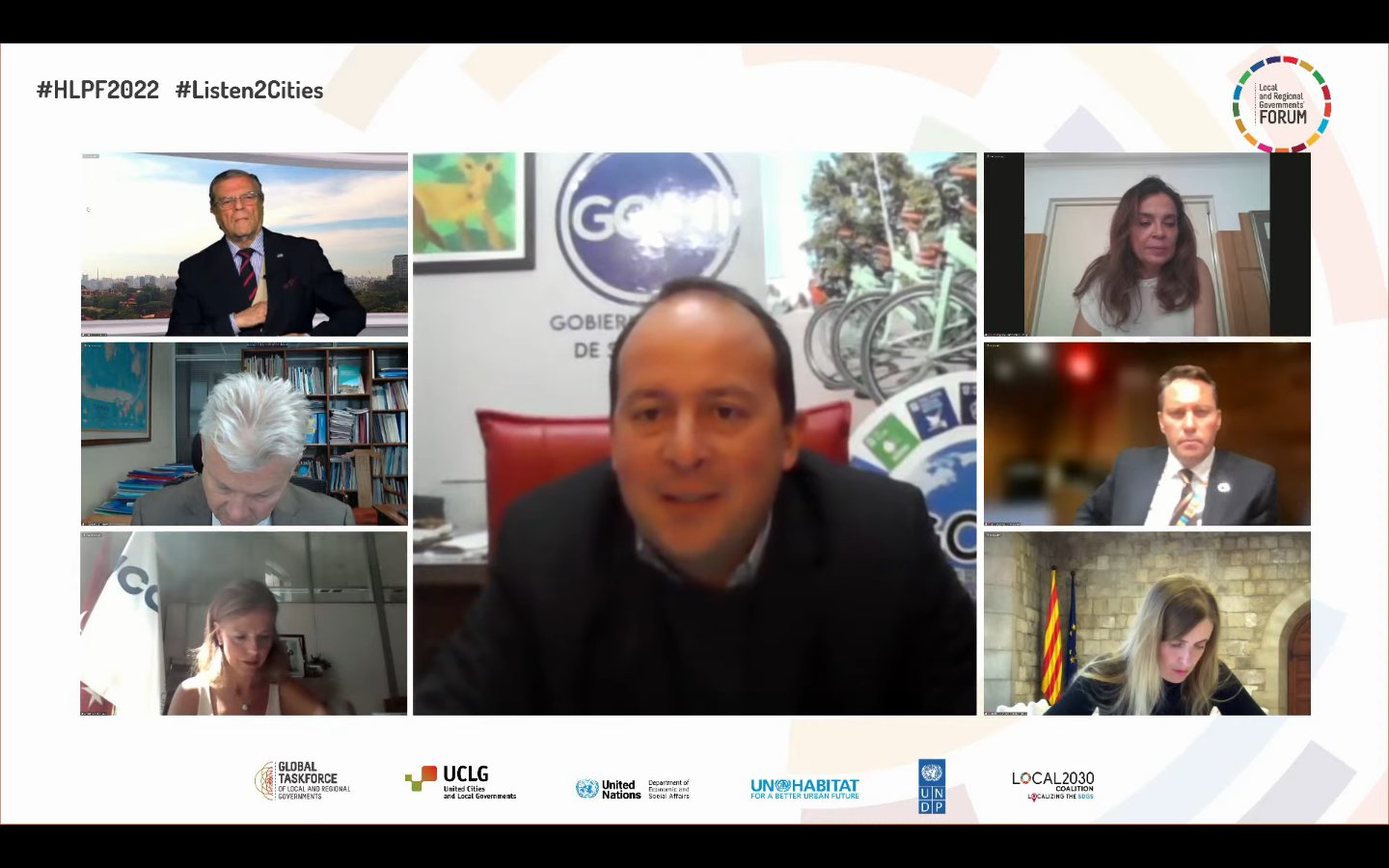
The VLR from Bogotá was presented by Luz Amparo Medina, Director of International Relations, who highlighted the coordination with national governments as a critical aspect, and how the VLR presented an opportunity to highlight the contribution of all actors to the SDGs in a city.
The national government was represented by Lusanda Batala, from the Secretariat of the National Committee of Planning of South Africa, who showcased the South African national coordination mechanism that includes local and regional governments, and highlighted that VLRs are essential to ingrain the SDGs in local plans and leave no-one behind.
Veronica C. Hitosis, Executive Director, League of Cities of the Philippines represented the network of the Philippines and highlighted that the VSR of the Philippines was a story of partnerships, focusing on gender and development, education and health, and called for not only increasing awareness of VLRs and VSRs but, fundamentally, to ensure a conscious buy-in from local governments, to ensure that all are aware and involved in reporting.
The second panel debated multilevel governance and multi stakeholder collaboration, and was moderated by Rafael Tuts, Director Global Solutions Division, UN-Habitat, who asked participants how subnational reporting can support local planning and strengthen relations with national governments.
Mahadi Che Ngah, Mayor of Kuala Lumpur laid out the synergies between local and regional governments and the Malaysian VNR, which had allowed Kuala Lumpur to identify gaps and challenges in localization in the city. Silvana Rivero, Minister of Coordination, Province of Cordoba, showcased the VLR of Córdoba, and called for the importance of bringing academia, the private sector and other stakeholders together to achieve the goals. Multilevel Governance, she argued, calls for interactive in a different table, defining and generating priorities tha can only be achieved from the bottom-up.
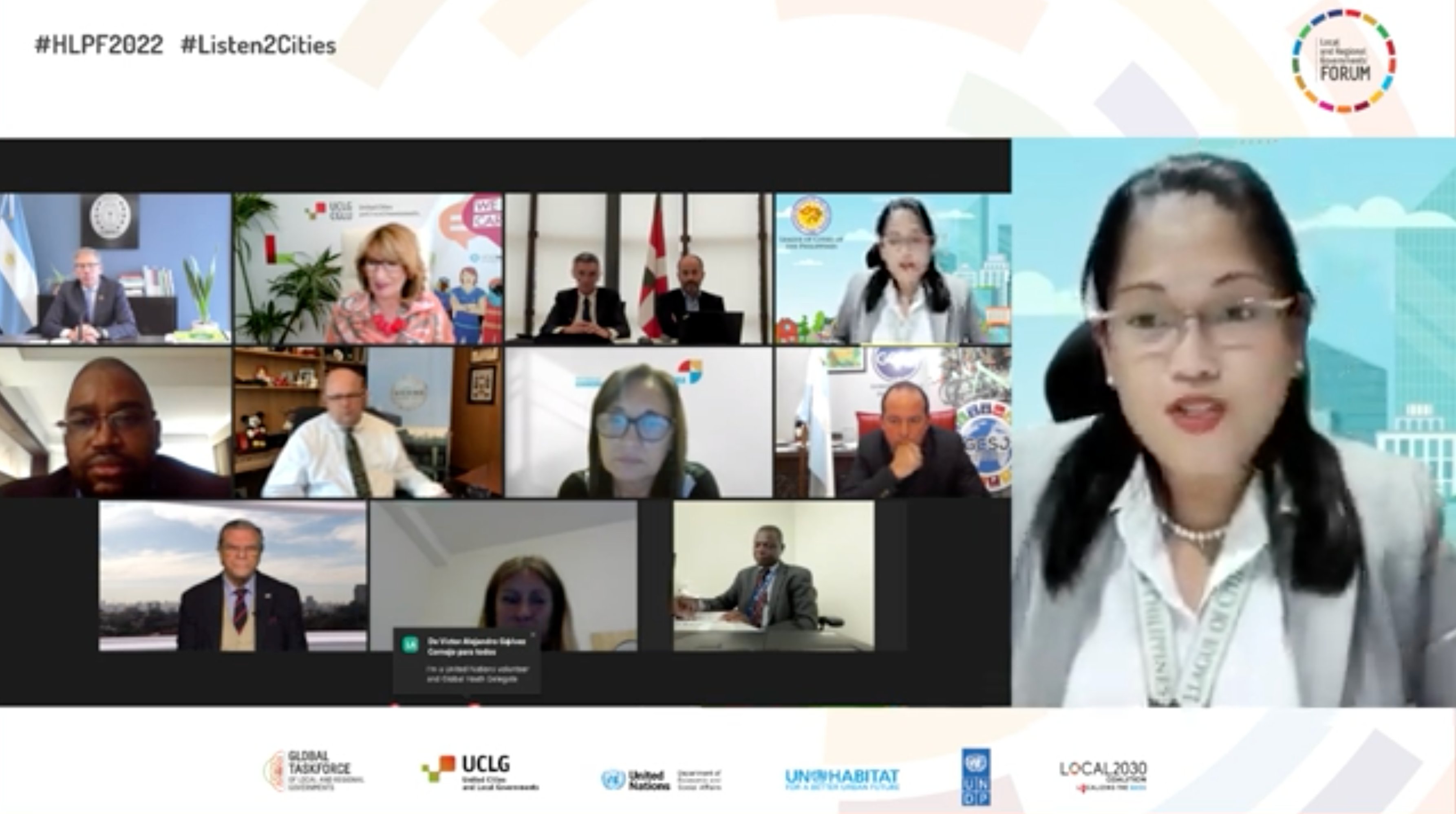
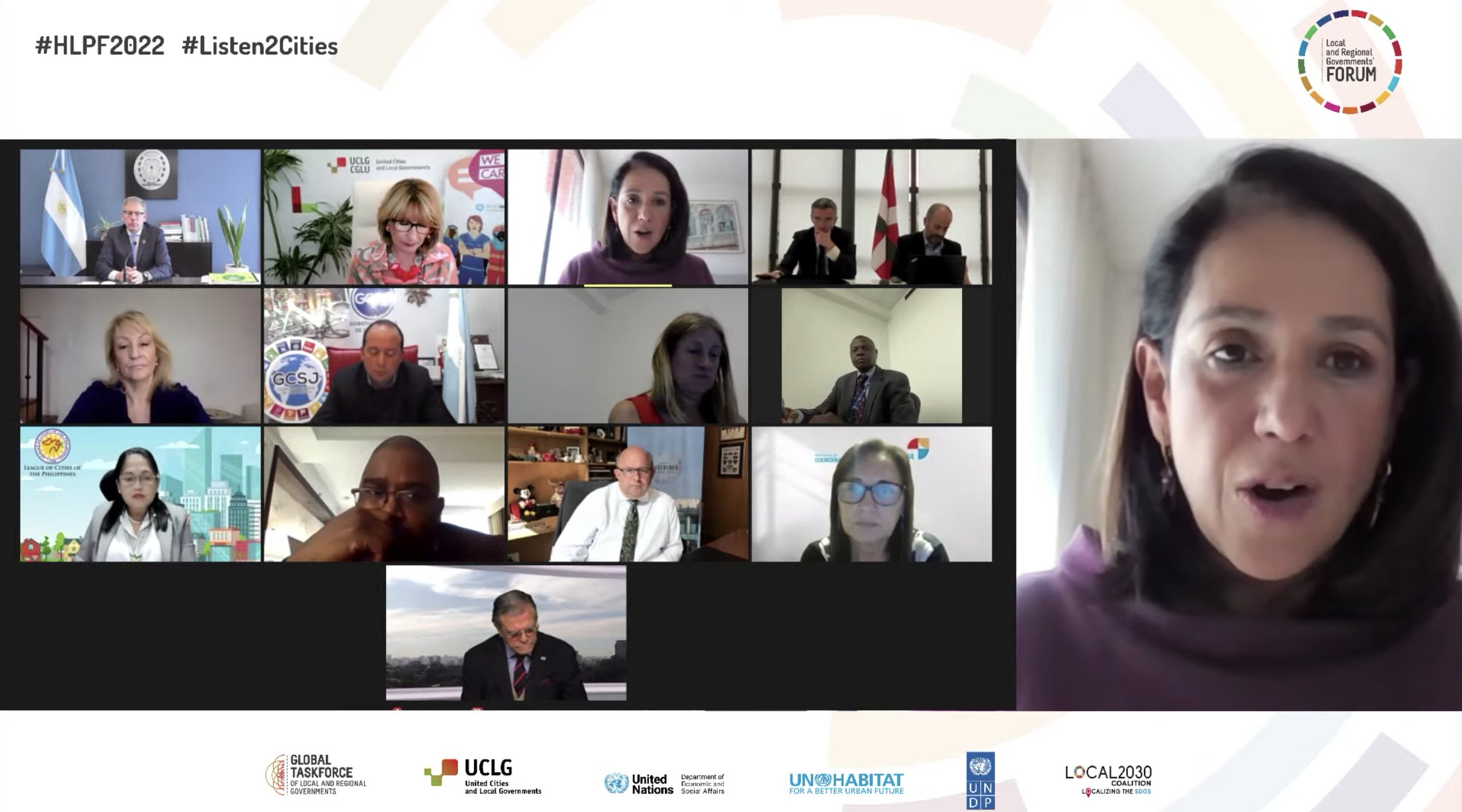
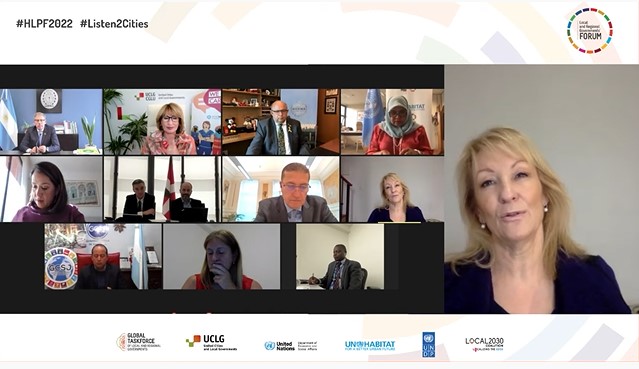
Luísa Salgueiro, Mayor of Matosinhos, brought critical messages from the Oceans Conference held in her city, and argued that coastal cities are crucial to build resilience and nature-based solutions to protect populations. Victoria Alsina, Minister, Foreign Action and Open Government, Catalonia, called on the need to involve populations in any and all SDG efforts in order for them to own the agenda and ensure that it happens.
Almudena Maíllo, Councillor of Madrid and Secretary General of UCCI laid out the strategies of UCCI to encourage SDG localization throughout the Network, including an atlas of iberoamerican cities - a tool to develop data that could help local and regional governments identify gaps and spaces to work on in order to achieve the goals. Ville Taajamaa, from the City of Espoo, called on the need for a multilevel and multi-stakeholder approach that is all about dialogue. VLRs as a starting point, and in between is about engagement and participation, a process of dialogue. Now is the time to scale and catalyze, and it all comes back to systemic sustainable development
Nicolás Cuesta, Mayor of San Justo also brought the view of an intermediary city in Argentina, and joined the call to enhance multilevel governance. We have parameters but no resources. and it is critical to empower cities and territories that are working and aligned to achieve the 2030 Agenda.
Affonso Massot, Executive Secretary of International Affairs, São Paulo State, wrapped up the first panel emphasizing what many participants had said: it is impossible to achieve goals nationally without collaboration and commitment of subnational governments. Local reviews are critical, and can have a strong impact across national governments.











